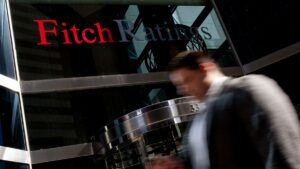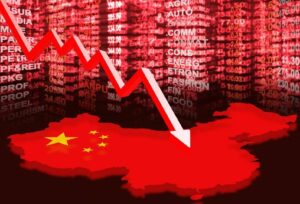
On Saturday night Kyiv time, international rating agency Fitch Ratings confirmed Ukraine’s long-term foreign currency issuer default rating (IDR) at “restricted default” (RD).
“Fitch believes that Ukraine is still in the process of broader restructuring, with its GDP warrants only becoming defaulted after the May 31 payment date. The long-term foreign currency IDR will remain at RD until Ukraine normalizes its relations with the vast majority of its external commercial creditors,” the agency said in a statement on its website.
Fitch recalls that following last year’s restructuring of outstanding sovereign Eurobonds and state-guaranteed debt of Ukravtodor and Ukrenergo a preliminary agreement was reached on the restructuring of their state-guaranteed Eurobonds worth $825 million (with payments suspended from November 9, 2024), which should be completed by July.
At the same time, Ukraine and the holders of GDP warrants (for a notional amount of $2.6 billion) have not been able to reach an agreement on restructuring, and Cargill’s $0.7 billion external commercial loan, payments on which have been suspended since September 3, 2024, has also not yet been restructured.
The agency also confirmed the national currency ECAI at ‘CCC+’, reflecting Ukraine’s continued servicing of its national currency debt. Only a small share (1.1% as of May 2025) is held by non-residents, while the majority is held by
the National Bank of Ukraine and domestic (mainly state-owned) banks, and this ownership structure limits the benefits for the country from debt restructuring in local currency, creating potential fiscal costs (including bank recapitalization).
Regarding the Ukrainian-Russian ceasefire talks, Fitch mentioned the first bilateral meeting in Istanbul in three years but noted that it did not lead to any breakthrough.
“The US administration’s stated goal of ending the war could lead to a negotiated ceasefire, but a peace agreement is unlikely due to the difficult-to-reconcile positions of both sides,” the agency said.
It added that the agreement on mineral extraction between the US and Ukraine had eased diplomatic tensions, but the potential economic benefits, as well as the extent to which it could link US economic interests to Ukraine’s strategic security goals, remained highly uncertain.
As for the fiscal deficit, Fitch pointed to its reduction to 17.2% of GDP in 2024 thanks to high revenue performance despite the economic slowdown, and forecast an increase in the deficit to 19.3% of GDP in 2025.
“High spending pressures will persist even after the end of the war, as Ukraine is likely to maintain a significant military presence,” the agency said, noting that Ukraine will need $524 billion in reconstruction over the next decade, which is about 2.8 times Ukraine’s nominal GDP in 2024.
The publication emphasizes that Ukraine’s financing needs this year will be comfortably met, leaving additional liquidity buffers for next year: net foreign financing will reach $55 billion compared to an average of $25 billion per year in 2022-24, mainly due to advance receipts from frozen Russian assets. At the same time, uncertainty regarding financing for 2026 and beyond remains high. Fitch expects domestic borrowing to increase in 2026 thanks to a relatively stable banking sector and low domestic financing this year.
Slovakia plans to allocate EUR 84 million in loans and grants for the restoration of the infrastructure of NEC Ukrenergo. Slovakia is ready to allocate about EUR 84 million in loans and grants for the implementation of projects to restore and develop the infrastructure of NEC Ukrenergo. The company announced this on Friday, citing investment director Oleg Pavlenko. “In particular, we are talking about the construction of a new high-voltage line in a region that has been severely affected by Russian shelling, the construction of a new Ukrenergo substation, and the reconstruction of an existing one,” he said.According to Pavlenko, the implementation of each of these initiatives is very important for the system operator, as these measures will significantly strengthen the stability of the Ukrainian energy system. Ukrenergo executives discussed the implementation of joint projects and the possible participation of Slovak businesses in the restoration of Ukraine’s energy sector with representatives of the Slovak government. In particular, they discussed attracting infrastructure investments under the European program to support Ukraine, Ukraine Facility. The implementation of projects to restore Ukraine’s energy infrastructure with the support of Slovak partners will be administered by the Export-Import Bank of the Slovak Republic and the Slovak Development Agency with the assistance of the country’s government.Fitch confirms Ukraine’s “restricted default” rating On Saturday night, the international rating agency Fitch Ratings confirmed Ukraine’s long-term foreign currency issuer default rating (IDR) at “restricted default” (RD). “Fitch believes that Ukraine is still in the process of broader restructuring, with its GDP warrants only becoming defaulted after the May 31 payment date. The long-term foreign currency IDR will remain at RD until Ukraine normalizes its relations with the vast majority of its external commercial creditors,” the agency said in a statement on its website.Fitch recalls that following last year’s restructuring of outstanding sovereign Eurobonds and state-guaranteed debt of Ukravtodor and Ukrenergo reached a preliminary agreement on the restructuring of its state-guaranteed Eurobonds worth $825 million (with payments suspended from November 9, 2024), which should be completed by July.At the same time, Ukraine and the holders of GDP warrants (for a notional amount of $2.6 billion) have not been able to reach an agreement on restructuring, and Cargill’s external commercial loan of $0.7 billion, payments on which have been suspended since September 3, 2024, has also not yet been restructured.The agency also affirmed the national currency IDR at ‘CCC+’, reflecting Ukraine’s continued servicing of its domestic debt.
Only a small share (1.1% as of May 2025) is held by non-residents, while the majority is held by the National Bank of Ukraine and domestic (mainly state-owned) banks, and this ownership structure limits the benefits for the country from debt restructuring in national currency, creating potential fiscal costs (including bank recapitalization). Regarding the Ukrainian-Russian ceasefire talks, Fitch recalled the first bilateral meeting in Istanbul in three years, but noted that it did not lead to any breakthrough.The US administration’s stated goal of ending the war could lead to a ceasefire through negotiations, but a peace agreement is unlikely due to the difficult positions of both sides,” the agency said.It added that the agreement on mineral extraction between the US and Ukraine has eased diplomatic tensions, but the potential economic benefits, as well as the extent to which it can link US economic interests to Ukraine’s strategic security goals, remain highly uncertain.As for the fiscal deficit, Fitch pointed to its reduction to 17.2% of GDP in 2024 thanks to high revenue performance despite the economic slowdown, and forecast an increase in the deficit to 19.3% of GDP in 2025.High pressure on spending will remain even after the end of the war, as Ukraine is likely to maintain significant military forces,” the agency believes, also recalling the need for $524 billion in reconstruction over the next decade, which is approximately 2.8 times Ukraine’s nominal GDP in 2024.The publication notes that Ukraine’s financing needs this year will be comfortably met, leaving additional liquidity buffers for next year: net foreign financing will reach $55 billion, compared to an average of $25 billion per year in 2022-24, mainly thanks to advance receipts from frozen Russian assets. At the same time, uncertainty regarding financing for 2026 and beyond remains high. Fitch expects domestic borrowing to increase in 2026 thanks to a relatively stable banking sector and low domestic financing this year.

International rating agencies S&P Global and Fitch have downgraded their outlooks for China’s residential real estate market.
real estate, despite Beijing’s announced package of measures to support it.
S&P forecasts a 15% decline in housing sales in China this year, while earlier it expected a 5% decline. According to the agency’s forecast, published on Thursday, the volume of sales of residential real estate in the country will total less than 10 trillion yuan ($1.4 trillion) this year, about half the peak level recorded in 2021.
Fitch this week also worsened its forecast for home sales in the PRC: the agency now expects sales to fall by 15-20% this year, rather than the 5-10% previously estimated.
The lowered forecasts show that rating agencies are not confident in the success of a large-scale package of market support measures, the launch of which the Chinese authorities announced in May. In particular, it includes the abolition of the lower limit on mortgage rates, as well as lowering down payment requirements for real estate buyers using mortgages. In addition, Beijing urged authorities in cities with a surplus stock of ready-made houses to buy back properties at reasonable prices for later use as affordable housing.
Prices of new buildings in China’s major cities fell for the 11th straight month in May. According to a report by China’s State Statistics Office (SSO), the cost of new housing in the country’s 70 largest cities fell 3.9% year-on-year last month, the most since June 2015.
Real estate accounts for about 78% of Chinese residents’ wealth, Bloomberg notes.

International rating agency Fitch Ratings forecasts the average oil price to reach $80 per barrel in 2023, according to its latest Global Economic Outlook (GEO).
Next year, it is expected to drop to $75 per barrel, and in 2025 – to $70 per barrel.
According to the agency’s analysts, the Japanese yen to the US dollar exchange rate will be around 145 yen/$1 at the end of this year, 135 yen at the end of 2024, and 125 yen at the end of 2025.
The single currency exchange rate in the next three years will be EUR 0.92/USD 1.
The pound sterling is expected to reach $1.25 in 2023-2024 and $1.2 in 2025.
The forecast for the Chinese currency at the end of this year is 7.2 yuan/$1, and for the next two years – 7.3 yuan/$1.